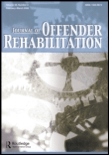
Journal of Offender Rehabilitation
Scope & Guideline
Pioneering Insights for Effective Rehabilitation Strategies
Introduction
Aims and Scopes
- Substance Use and Recovery:
Explores the impact of substance use disorders on recidivism and rehabilitation, examining various treatment modalities and their effectiveness in correctional settings. - Mental Health Interventions:
Investigates the role of mental health services in rehabilitation, including coping strategies, psychological support, and the integration of mental health care into correctional systems. - Reentry and Reintegration:
Focuses on the challenges and factors influencing successful reintegration of formerly incarcerated individuals into society, including housing, employment, and social support. - Youth and Juvenile Justice:
Studies the rehabilitation of juvenile offenders, addressing unique needs, challenges, and effective intervention strategies for younger populations. - Family and Community Dynamics:
Examines the influence of family relationships and community engagement on rehabilitation outcomes, emphasizing the importance of social capital and support networks. - Cultural and Contextual Factors:
Analyzes how cultural, social, and contextual factors affect rehabilitation processes, outcomes, and the experiences of diverse populations within the criminal justice system.
Trending and Emerging
- Technology in Rehabilitation:
There is an increasing interest in the use of technology, such as e-learning platforms and virtual reality, to enhance rehabilitation methods and training for offenders. - Holistic Approaches to Recovery:
Research is expanding on holistic rehabilitation strategies that address mental health, substance use, and social factors simultaneously, leading to more comprehensive intervention models. - Aging Offenders:
The challenges faced by older incarcerated individuals and their rehabilitation needs are gaining attention, reflecting demographic changes within the criminal justice system. - Trauma-Informed Care:
Emerging themes around trauma-informed approaches in rehabilitation are becoming more prominent, focusing on understanding and addressing the past traumas of offenders. - Gender-Specific Interventions:
There is a growing emphasis on gender-responsive programming that takes into account the unique experiences and needs of women in the criminal justice system.
Declining or Waning
- Traditional Penological Approaches:
Research focusing on punitive measures and traditional incarceration methods seems to be less prevalent, as the journal moves towards more rehabilitative and restorative approaches. - General Deterrence Theory:
Studies centered around the deterrent effect of punishment without a focus on rehabilitation or reintegration are becoming less common, indicating a shift towards understanding underlying factors of behavior change. - Static Risk Assessment Tools:
There is a noticeable decline in research solely based on static risk factors for recidivism, with a growing emphasis on dynamic factors and holistic approaches to assessment. - Overemphasis on Recidivism Rates:
While recidivism remains an important metric, the journal is increasingly focusing on broader measures of success and well-being for formerly incarcerated individuals, suggesting a shift in evaluative frameworks. - Historical Perspectives on Rehabilitation:
Less attention is being given to historical analyses of rehabilitation methods, with a trend towards contemporary practices and innovations in the field.
Similar Journals
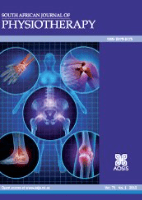
South African Journal of Physiotherapy
Innovating Practices in Sports Therapy and RehabilitationWelcome to the South African Journal of Physiotherapy, an esteemed open access journal published by AOSIS that has been serving the physiotherapy community since 2002. This journal is dedicated to advancing knowledge in the fields of Physical Therapy, Sports Therapy, and Rehabilitation, featuring a wide array of research articles, clinical studies, and reviews. With an ISSN of 0379-6175 and E-ISSN of 2410-8219, the journal is indexed in Scopus and has been classified in the third quartile (Q3) as of 2023, ranking #153 out of 247 within its category. Based in South Africa, the journal reflects the rich therapeutic landscape of the region and promotes international collaboration in physiotherapy research. By providing a platform for innovative ideas and practices, the South African Journal of Physiotherapy aims to foster excellence in education and practice among researchers, professionals, and students alike.
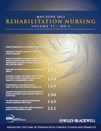
Rehabilitation Nursing
Innovating nursing strategies for transformative rehabilitation.Rehabilitation Nursing, published by Lippincott Williams & Wilkins, is an esteemed journal dedicated to advancing the fields of rehabilitation, nursing, and physical therapy. With an ISSN of 0278-4807 and an E-ISSN of 2048-7940, this journal has been a crucial resource for practitioners and researchers since its inception in 1975, continuously providing insights through its convergence of scholarship up to 2024. As a member of the Q3 category in multiple disciplines, including Medicine (Miscellaneous), Nursing (Miscellaneous), and Physical Therapy, the journal affirms its relevance within the academic community, particularly highlighted by its Scopus rankings. With a focus on disseminating innovative research, clinical findings, and evidence-based practices, Rehabilitation Nursing aims to enhance patient care and foster improvements in rehabilitation strategies. Whether one seeks to stay abreast of the latest developments or contribute new insights, this journal is a must-read for those involved in the fields of rehabilitation and nursing.

Substance Abuse and Rehabilitation
Connecting researchers and practitioners in the fight against substance abuse.Substance Abuse and Rehabilitation, published by DOVE MEDICAL PRESS LTD, is a leading open-access journal dedicated to the study and treatment of substance abuse and related rehabilitation practices. With its ISSN 1179-8467, this journal provides a vital platform for researchers, clinicians, and students to disseminate their findings and insights in a field increasingly relevant to public health. Since becoming open access in 2010, the journal has enhanced its reach, allowing for a broader audience to engage with cutting-edge research and reviews that address the complexities of substance abuse disorders. The journal aims to foster innovation and interdisciplinary collaboration by publishing high-quality peer-reviewed articles that cover a wide range of topics, including addiction therapy, policy implications, and the social determinants of substance use. As a vital resource within the realm of addiction research, Substance Abuse and Rehabilitation plays a crucial role in driving forward knowledge and practices that can improve outcomes for individuals and communities affected by substance use issues.

Justice Evaluation Journal
Advancing the discourse on justice systems.Welcome to the Justice Evaluation Journal, a leading publication in the field of law, published by Taylor & Francis Ltd, renowned for its commitment to advancing scholarly discourse. With an ISSN of 2475-1979 and an E-ISSN of 2475-1987, this journal has established itself as a pivotal resource for researchers, practitioners, and students from its inception in 2018 through to its ongoing contributions in 2024. Achieving a prestigious Q1 ranking in the law category, and earning a remarkable 90th percentile rank in Scopus, the journal is dedicated to evaluating and disseminating critical insights on justice systems and reform. Although not an open-access journal, it continues to foster deep scholarly engagement through a rigorous peer-review process. The Justice Evaluation Journal serves as an essential platform for those committed to improving the effectiveness and fairness of legal institutions worldwide, making it indispensable in your academic and professional journey.

Journal of Criminological Research Policy and Practice
Fostering Interdisciplinary Dialogue on CriminologyJournal of Criminological Research Policy and Practice is a pioneering platform dedicated to the exploration and dissemination of knowledge in the interdisciplinary field of criminology. Published by Emerald Group Publishing Ltd, this journal features high-quality research that addresses contemporary issues and innovative practices in areas such as law, public administration, and social psychology. With an ISSN of 2056-3841 and an E-ISSN of 2056-385X, the journal has garnered a notable presence in the academic community, showcasing a Q3 ranking in Law and Sociology & Political Science as of 2023. The journal provides valuable insights for researchers and practitioners alike, advancing the discourse on criminological policy and its implications for society. It serves as an essential resource for those invested in enhancing social justice, informing policy-making, and understanding the complexities of crime within a broader social context. Encompassing research from 2015 to the present and extending into 2024, the journal stands as a critical reference point for future studies and professional practice in criminology.
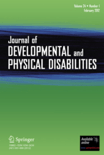
JOURNAL OF DEVELOPMENTAL AND PHYSICAL DISABILITIES
Advancing knowledge for a brighter future.JOURNAL OF DEVELOPMENTAL AND PHYSICAL DISABILITIES is a premier publication dedicated to the advancement of knowledge within the realms of developmental psychology, rehabilitation, and therapeutic practices. Published by Springer/Plenum Publishers, this journal serves as a critical platform for researchers, clinicians, and educators who are passionate about understanding and improving the lives of individuals with developmental and physical disabilities. With an impressive Timeline spanning from 1991 to 2024, it holds significant rankings in Category Quartiles, including Q3 in Developmental and Educational Psychology and Q2 in Physical Therapy, Sports Therapy, and Rehabilitation. The journal reaches a broad audience in the United States and beyond, providing insightful research articles that contribute to both theoretical and practical applications in the field. Although not currently an open-access platform, its strategic positioning within Scopus rankings underscores its importance, featuring a rank of 80/247 in Health Professions and 163/360 in Psychology. The journal is an essential resource for those committed to promoting evidence-based practices and enhancing the quality of life for people with disabilities.
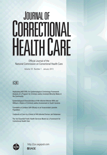
Journal of Correctional Health Care
Empowering change in the health of incarcerated populations.Journal of Correctional Health Care, published by Mary Ann Liebert, Inc, is a vital publication that addresses the crucial intersection of health care, justice systems, and public health. With ISSN 1078-3458 and E-ISSN 1940-5200, this journal has been a leading source of research and analysis in correctional health since its inception in 1994. As of 2023, it holds an esteemed ranking within the Q2 quartile for Community and Home Care and Q3 for Public Health, Environmental and Occupational Health, reflecting its significant contribution to these fields. The Journal of Correctional Health Care focuses on the healthcare needs of incarcerated populations, providing a platform for innovative research, comprehensive reviews, and policy analysis. Researchers, professionals, and students alike will find invaluable insights that bridge gaps in knowledge and practice, emphasizing the importance of equitable health care within correctional settings. This journal continues to shape discussions and influence practices aimed at enhancing health outcomes in these vulnerable communities.

PSYCHIATRIC REHABILITATION JOURNAL
Transforming Lives with Evidence-Based PracticesPSYCHIATRIC REHABILITATION JOURNAL, published by the Educational Publishing Foundation of the American Psychological Association, is a premier source of scholarly information and innovative research in the fields of psychiatric care, rehabilitation, and mental health. With its ISSN 1095-158X and E-ISSN 1559-3126, this journal has established itself as a leading platform, evidenced by its top-tier rankings — notably in the Q1 category for Health Professions (miscellaneous) and Rehabilitation, as well as a respectable Q2 ranking in Psychiatry and Mental Health for 2023. The journal's convergence of scholarship from 1996 to 2024 underlines its longstanding commitment to advancing evidence-based practices and improving outcomes for individuals facing psychiatric challenges. Indexed in Scopus with robust rankings (e.g., Rank #8/78 in Health Professions), it serves as an essential resource for researchers, practitioners, and students dedicated to enhancing the quality of rehabilitation and mental health care in the United States and beyond. While the journal does not offer open access, its impact factor and professional relevance continue to make it invaluable for those engaged in the vital work of psychiatric rehabilitation.
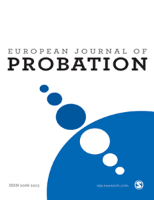
European Journal of Probation
Exploring interdisciplinary insights in criminal justice.The European Journal of Probation is a premier academic publication dedicated to the advancement of knowledge and research in the field of probation and criminal justice. Published by SAGE Publications Ltd in the United Kingdom, this journal proudly holds a Q1 category ranking in Law for 2023, emphasizing its role as a leading platform for scholarly discourse. With a focus on interdisciplinary approaches, the journal serves as a vital resource for researchers, practitioners, and students alike, exploring contemporary issues in probation practice, policy development, and evidence-based interventions. Since its inception in 2009, the European Journal of Probation has fostered a global community of thought leaders who are dedicated to enhancing the efficacy and equity of the probation system. The journal's commitment to quality research and innovative ideas significantly contributes to the ongoing evolution of the legal landscape and social justice. Researchers interested in submitting their work will find a conducive environment that champions high-impact research initiatives.
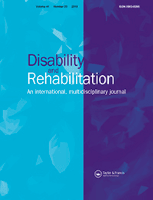
DISABILITY AND REHABILITATION
Shaping the Future of Rehabilitation Through Rigorous Scholarship.Disability and Rehabilitation, a prestigious journal published by Taylor & Francis Ltd, plays a critical role in the field of rehabilitation science. Since its inception in 1978, this journal has been dedicated to presenting high-quality research focused on improving the lives of individuals with disabilities through innovative rehabilitation techniques and healthcare solutions. With an impressive Q1 ranking in the Rehabilitation category and a Scopus rank of #24 out of 161, the journal is recognized for its significant impact and rigorous scholarly contributions, boasting an 85th percentile performance among peers. Although it operates under a subscription model, the journal remains a vital resource for researchers, healthcare professionals, and students seeking the latest insights and developments in the realm of disability and rehabilitation. Covering a broad spectrum of topics, from clinical practices to theoretical advancements, Disability and Rehabilitation continues to shape the future of rehabilitation research and practice worldwide.